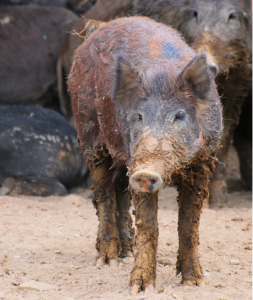North Carolina Feral Swine Task Force
go.ncsu.edu/readext?836985
en Español / em Português
El inglés es el idioma de control de esta página. En la medida en que haya algún conflicto entre la traducción al inglés y la traducción, el inglés prevalece.
Al hacer clic en el enlace de traducción se activa un servicio de traducción gratuito para convertir la página al español. Al igual que con cualquier traducción por Internet, la conversión no es sensible al contexto y puede que no traduzca el texto en su significado original. NC State Extension no garantiza la exactitud del texto traducido. Por favor, tenga en cuenta que algunas aplicaciones y/o servicios pueden no funcionar como se espera cuando se traducen.
Português
Inglês é o idioma de controle desta página. Na medida que haja algum conflito entre o texto original em Inglês e a tradução, o Inglês prevalece.
Ao clicar no link de tradução, um serviço gratuito de tradução será ativado para converter a página para o Português. Como em qualquer tradução pela internet, a conversão não é sensivel ao contexto e pode não ocorrer a tradução para o significado orginal. O serviço de Extensão da Carolina do Norte (NC State Extension) não garante a exatidão do texto traduzido. Por favor, observe que algumas funções ou serviços podem não funcionar como esperado após a tradução.
English
English is the controlling language of this page. To the extent there is any conflict between the English text and the translation, English controls.
Clicking on the translation link activates a free translation service to convert the page to Spanish. As with any Internet translation, the conversion is not context-sensitive and may not translate the text to its original meaning. NC State Extension does not guarantee the accuracy of the translated text. Please note that some applications and/or services may not function as expected when translated.
Collapse ▲For years, feral swine have been migrating across the United States and can now be found across most of North Carolina. The destruction these animals cause is a significant threat to agriculture and the environment and costs $1.5 billion in damages annually in the U.S. This invasive species goes by many names, feral swine, feral hogs, or wild hogs. Whatever you chose to call them, they are dangerous to humans and wildlife and have few natural predators, which allows them to spread unfettered without human intervention.
While signs of their presence can often be found, it’s unlikely you will see one in Randolph County due to their current low population. However, in a proactive effort to monitor the spread in our county and the surrounding area, a partnership of state and federal agencies are working together in what is called the North Carolina Feral Swine Task Force. The goal of this task force is to understand the feral swine problem in North Carolina and to take action to remove them from the landscape. Programs include education about feral swine, equipping landowners with traps, taking blood samples to test for diseases carried by the hogs, and to promote reporting of feral swine sightings, damage, and harvest. Reporting is one of the most critical pieces of this integrated approach and is something we rely heavily on the public to do. To report a sighting, damage, or harvest go to NC Feral Swine and click the “Report Feral Swine” tab. If you are interested in using a trap on your property then please see the application on the previously mentioned website. You will be prompted to go through an assessment to see the extent of damage on your property and also will need to attend a trap demonstration and training session. If you have questions about this project or feral swine, feel free to email contactus@ncferalswine.org or call 336-318-6000 to reach the N.C. Cooperative Extension of Randolph County office.





